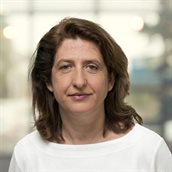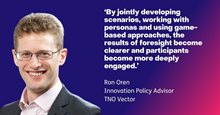The Netherlands: Artificial Intelligence Readiness Assessment Report
The UNESCO report highlights that the Netherlands plays a leading role in AI due to robust legislation and transparency. The establishment of a central algorithm register strengthens public trust in AI, which is essential for innovation and societal acceptance.
The Dutch AI landscape
On behalf of the ministries of OCW and BZK, TNO Vector applied and elaborated the methodology as the basis for the ‘The Netherlands Artificial Intelligence Readiness Assessment Report’. It provides a comprehensive overview of the Dutch AI landscape, viewed from the perspectives of legislation and regulation, society and culture, science and education, economy, and technology and infrastructure.
Blueprint
“The report not only provides a comprehensive and objective picture of where we stand with AI in our country but also serves as an example of how other countries can apply the Readiness Assessment Methodology, RAM. Through UNESCO, we have already been approached by countries wanting to know how they should follow this methodology to develop their own strategy. They want to understand the instrument and are curious about how we set up and applied the research method. This way, we can help them deploy AI ethically,” says research lead Tom Barbereau of TNO Vector.
New insights
The methodology consisted of inventorying about a hundred qualitative and quantitative indicators that clarify how a country performs in the field of AI. TNO collected, processed, and analyzed data on all these indicators. There has also been extensive research into strategic and policy issues surrounding digitization and AI by TNO and other organizations. All this knowledge provides new insights for decision-making by policymakers or other parties. They can deduce from this which steps they need to take to elevate AI policy to the next level.
Consulting external experts
The recommendations in the report were partly based on consultations with experts from various fields from academia, business, and government. These consultations included representatives from UNESCO, the ministries of OCW, BZK, and EZ, the universities of Leiden, Utrecht, and Amsterdam, The Hague University of Applied Sciences, the AI coalition for the Netherlands (AIC4NL), VNO-NCW, the European Center for Not-for-Profit Law (ECNL), and TNO. Two workshops were held with this expert team in 2024. In these workshops, the participants' views, reflections, and expectations were inventoried, and recommendations were subsequently brought forward.
The Netherlands well positioned
In the ‘Recommendation’ from UNESCO, ethically responsible handling of AI covers a wide range of topics: protection and promotion of human rights, human dignity, freedom of expression, and ecological sustainability, which translate into principles such as accountability, transparency, and privacy.
The report shows that the Netherlands is well positioned for AI. Our country has already invested heavily in this early on, and the government closely aligns with the AI regulation of the European Union and the Council of Europe Framework Convention on Artificial Intelligence. As a result, our country achieves an above-average score within the United Nations E-Government Indexes and other rankings in the field of investments in AI research and cybersecurity. This does not mean that the Netherlands is ready. The formulated recommendations emphasize the need for continuous attention to AI governance.
Recommendations
“Our independent position in conducting the RAM is one we usually take in the context of collaborations with the Dutch government,” explains researcher Wouter van der Bij. “Here, the crucial factor was our capacity to collect and combine insights from various in-depth TNO research lines over the past years. Looking ahead, we also see great opportunities to strengthen the identified recommendations through interdisciplinary research into responsible use of AI, such as DIVERSIFAIR to identify intersectional bias in AI or the development of GPT-NL as a responsible and sovereign alternative to existing LLMs.”





